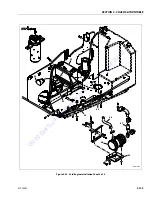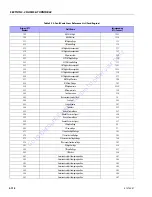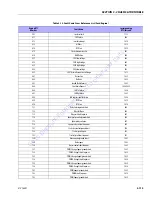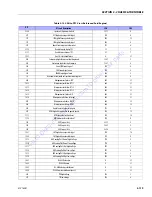
SECTION 3 - CHASSIS & TURNTABLE
3-106
31215031
APPROVED ENGINES
The 912, 913, 914, 1011, 2011, 1012, 2012, 1013, 2013, 413 and
513 series are approved for bio-diesel from year of manufac-
ture 1993 under compliance with the basic conditions speci-
fied below.
BASIC CONDITIONS TO BE OBSERVED
• A power loss of 5-9 % in relation to diesel fuel in accor-
dance with EN 590 is possible due to the lower heating
value. Blocking of the fuel injector is not allowed.
• The lubricating oil quality must correspond to TR 0199-99-
3002. The lubricating oil change interval must be halved in
relation to operation with diesel fuel in accordance with EN
590.
• Standstills of longer than 4 to 6 weeks must be avoided
with bio-diesel. Otherwise the engine must be started and
stopped with diesel fuel.
• Bio-diesels can be mixed with normal diesel fuel but the
basic conditions described in this subsection apply for mix-
tures. Mixtures with up to 5 % (m/m) bio-diesel (B5) which
have recently been on sale at European fuel stations are
excepted. These fuels must be treated like normal diesel
fuels because EN 590 expressly permits adding up to 5 %
(m/m) bio-diesel in accordance with EN 14214.
• Approx. 30-50 hours after changing over from diesel fuel to
bio-diesel, the fuel filter should be changed as a preventive
measure to avoid a drop in performance due to clogged
fuel filters. Deposited fuel ageing products are dissolved by
bio-diesel and transported into the fuel filter. They should
not be changed immediately but after approx. 30 to 50
hours because the dissolving of dirt takes a certain amount
of time.
PLANT OIL
PURE PLANT OILS (E.G. RAPE SEED OIL, SOY OIL, PALM OIL) ARE NOT CLASSI-
FIED AS BIO-DIESEL AND EXHIBIT PROBLEMATICAL PROPERTIES FOR DIESEL
ENGINE OPERATION (STRONG TENDENCY TO COKE, RISK OF PISTON SEIZURE,
EXTREMELY HIGH VISCOSITY, POOR EVAPORATION BEHAVIOR.
The conversion of DEUTZ engines to rape seed oil fuel opera-
tion with conversion kits and modified tanks systems of vari-
ous manufacturers is not allowed and leads to loss of warranty
rights.
Biological Contamination In Fuels
SYMPTOMS
The following symptoms may indicate that a fuel tank is con-
taminated by micro-organisms:
• . Internal tank corrosion,
• . Filter blockage and the associated loss of power due to
gel-like deposits on the fuel filter (especially after long
standstills)
CAUSE
Micro-organisms (bacteria, yeasts, funguses) can form bio-
sludge under unfavorable conditions (favoured particularly by
heat and water).
Penetration by water is usually caused by condensation of the
water in the air. Water does not dissolve in fuel so that the pen-
etrating water collects at the bottom of the tank. The bacteria
and funguses grow in the watery phase, at the phase bound-
ary to the fuel phase, from which they draw their nutrition.
There is an increased risk especially with biodiesel (FAME).
PREVENTIVE MEASURES
• Keep the storage tank clean, regular cleaning of the tank by
specialist companies
• Installation of fuel pre-filters with water traps, especially in
countries with frequently fluctuating fuel qualities and
high percentage of water.
If the fuel system and storage tank have already been attacked
by micro-organisms. The biocide must be dosed according to
the manufacturer's specifications.
• Avoid direct exposure of the storage tank to sunlight
• Use smaller storage tanks with corresponding low dwell
times of the stored fuel
FUEL ADDITIVES
The use of fuel additives is not permitted. The flow improvers
mentioned above are an exception. Use of unsuitable addi-
tives will result in loss of warranty.
Go
to
Discount-Equipment.com
to
order
your
parts

































